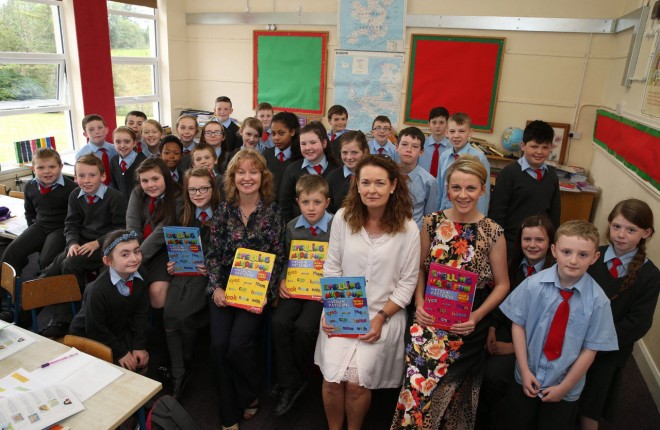
Louise Finnegan with colleagues Susan Doherty, principal, Maeliosa McAteer and pupils of Drumoghill National School.
BY HARRY WALSH
A TEACHER at Drumoghill National School is pioneering an exciting new programme which encourages ways of improving spelling through sheer enjoyment of language.
Improving spelling becomes harder the older you get, but ‘Spelling Made Fun with Visual Patterns’ aims to help children with spelling difficulties from the first years of primary school.
The innovative programme has been devised by Ms Louise Finnegan, a Learning Support Teacher at Drumoghill NS, where, according to the most recent Bell Curve spelling tests, pupils are among the best spellers in the country.
Speaking to the Donegal News, Ms Finnegan explained that good reading and good spelling do not always go hand in hand. Encouragement to read at home as well as at school undoubtedly helps, but simply reading more books will not teach children to spell.
“I was ‘subbing’ in Susan’s (Doherty) class two years ago when I noticed that, although children were learning big words, they weren’t functional words so I decided to change things round a bit. I taught them a few gimmicks and rules to make spelling easier and, towards the end, I found that even those children who couldn’t be bothered initially were starting to take an interest,” she said.
That was September 2013, and for the following academic year she put together a programme on a series of A4 sheets of paper, devised to help improve spelling.
“The feedback was really positive from the parents, so I kept at it last year (2014) when a school inspector remarked on the high standards of literacy within the school. She was told about the spelling programme and she came back to me before last Christmas and asked me to do a few more. My husband (Leo) was quite sick at that time and I felt that I had too much on my plate. She (the inspector) was back in February for another inspection, though, and her parting word to me on that occasion was that I needed to publish the spelling programme,” she said.
At that point she made contact with Brian Higgins, ABC Bookshop, and things just took off from there, culminating in the book being published in the summer.
“It takes away the whole threat of spelling tests. It looks at patterns and helps reduce the memory load and therefore makes words simpler to retain,” she said.
Visual approach
She believes that spelling is best taught through a visual approach – learning what words look like – rather than through phonics (the system of ‘sounding out’ words: c-a-t spells cat), which most schools use to some extent in teaching reading. She also noted that spelling rules such as the often repeated ‘i before e, except after c’ have limited use, since few are entirely reliable.
“I find that children who find spelling difficult make the most progress. It’s all about building confidence,” she said.
“Spelling is a visual exercise. For example, in second class a child will be given a core word like ‘ear’ and they will then see other related words like clear, dear, hear, wear, fear, earn, early, nearly, heard and earth – a pattern, a connection.
“In fourth class the link word might be ‘pie’ and from that you get pier, happier, piece and pierce,” she said.
Seven-year-olds should be able to spell words such as sun, leaf and desk; nine-year-olds should be taught to distinguish between words in same-sounding groups such as there, their and they’re; 11-year-olds should be able to spell business, procession and signature while the last word a primary school pupil is asked to spell is catastrophe!
Since its introduction two years ago, the programme has proven to be a resounding success.
“I was nervous when the first Bell Curve spelling results came out two years ago, but I was blown away. One child had improved by forty per cent,” she said.
Spelling and meaning
Wordplay, jokes, rhymes and poems are important spelling aids – Gym – Get Your Membership and They – The Happy Elf Yawns. Others emphasise links between spelling and meaning, particularly for older children: The word conscience, for instance, becomes easier to spell when you realise it is ‘science’ plus ‘con’.
“I would like to pay tribute to Susan Doherty, Principal, for her encouragement from the very start and to all the teachers at Drumoghill and Ayrhill NS for their help and support.
“The programme has been designed for parents and teachers. The project was undertaken at a time when there were health issues at home and I would like to thank my husband Leo and kids Ruairi and Ciara for their support,” she said.
‘Spelling Made Fun with Visual Patterns’ is available at ABC Bookshop in Letterkenny, with plans for extending the sale nationwide.
Receive quality journalism wherever you are, on any device. Keep up to date from the comfort of your own home with a digital subscription.
Any time | Any place | Anywhere
Posted: 12:11 pm September 11, 2015









